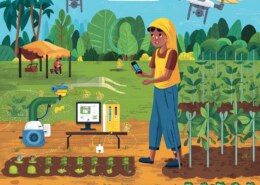What are some innovative approaches to sustainable water management in agriculture, especially in water-scarce regions?
Drought-resistant crops are plant varieties specifically bred or genetically modified to thrive in environments with limited water availability. These crops have adaptations that allow them to maintain productivity and yield under drought conditions, making them vital for agriculture in arid and semRead more
Drought-resistant crops are plant varieties specifically bred or genetically modified to thrive in environments with limited water availability. These crops have adaptations that allow them to maintain productivity and yield under drought conditions, making them vital for agriculture in arid and semi-arid regions.
Key adaptations of drought-resistant crops include deep root systems that access water from deeper soil layers, reduced leaf surface area to minimize water loss through transpiration, and enhanced water-use efficiency at the cellular level. Examples of such crops include certain varieties of sorghum, millet, and quinoa, which are naturally more resilient to drought conditions compared to traditional crops like rice and wheat.
The development and cultivation of drought-resistant crops are crucial in the face of climate change, which is expected to increase the frequency and severity of droughts worldwide. By incorporating these crops into agricultural systems, farmers can ensure food security, sustain livelihoods, and reduce the dependence on irrigation, thus conserving precious water resources. Research and development in this field continue to advance, with scientists utilizing modern biotechnological tools to enhance the drought tolerance of various crops further.
See less

Sustainable water management means using the water in a way that it meats the current and future social , cultural and economic demands without compromising the ability to meet those needs in future. Currently 70% of the world’s freshwater is withdrawal for the irrigation. To address this challengeRead more
Sustainable water management means using the water in a way that it meats the current and future social , cultural and economic demands without compromising the ability to meet those needs in future. Currently 70% of the world’s freshwater is withdrawal for the irrigation.
To address this challenge the key is to make agriculture system such that it produces more food using less water.For farmers sustainable water management means to manage the water which they have access to for best and highest use but not damaging the environment at the same time.
Innovative approach to sustainable water management in agriculture particularly in water scarce regions are important for managing water use :
So , by implementing and adopting these innovative approaches or practices for sustainable water management these can support sustainable agriculture ,improve resilience in water scarcity regions and effective use of water.
See less